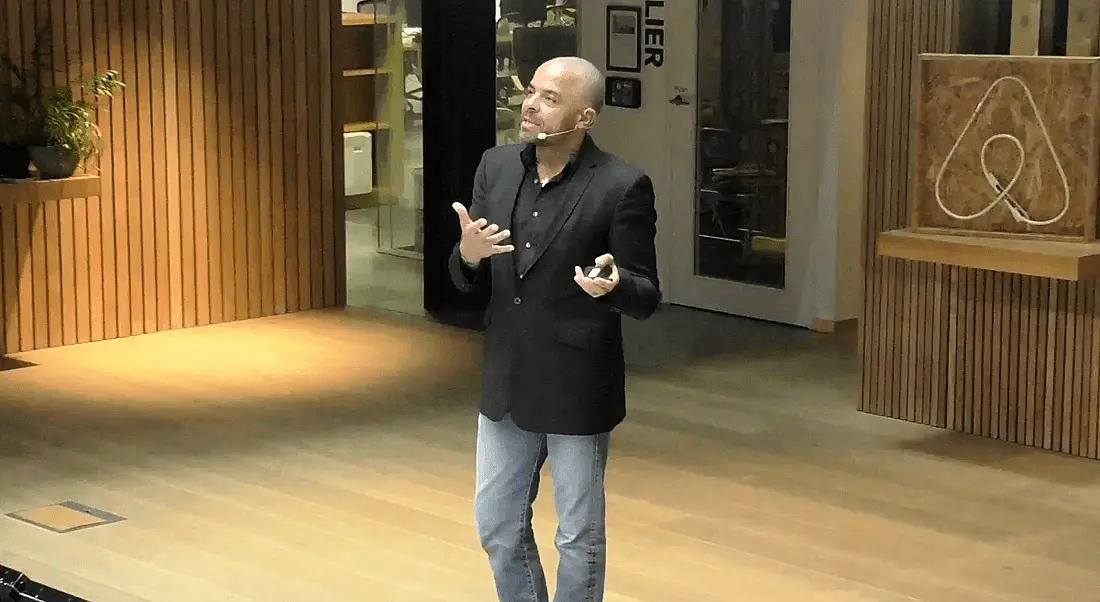During a keynote presentation, Airbnb CMO Jonathan Mildenhall outlined the power of purpose-driven marketing and the impact this can have on company culture and recruitment.
Love it or hate it, you cannot deny the power of advertising. Some of us may like to think ourselves immune to the machinations of marketeers, but we are all susceptible to the innumerable messages persistently pumped into our lives.
So, when Jonathan Mildenhall visited Dublin earlier this year, I was interested to learn a thing or two about crafting powerful messages that resonate from a true thought leader in branding and strategy. Starting his career in the nineties, Mildenhall worked his way up the ladder with stints at agencies such as McCann Erickson, Bartle Bogle Hegarty and Mother, where he was strategy director when he received a call from a headhunter in Chicago in 2006. Coca-Cola was looking for a new VP for global advertising, strategy and creative. At first, Mildenhall thought the caller was looking for recommendations.
After eight years at “the ultimate icon of corporate America”, Mildenhall left to take up the role of chief marketing officer (CMO) at Airbnb in 2014. As a brand geek, this was an “irresistible proposition”, trading an iconic brand for an iconic company with big aspirations.
‘There’s increasing research and data that proves that purpose-driven companies naturally attract and retain top talent’
– JONATHAN MILDENHALL
Mildenhall is unquestionably an expert in marketing. You simply don’t have the career he has had without an exceptional talent. But what struck me is how he conveyed the relevance of branding in establishing company culture. Marketing a product or message to your selected demographic to achieve sales is one thing, but building a brand philosophy that permeates a company as a whole is the potent power of expert marketing – the alchemy that Mildenhall has been known to create.
“Purpose-driven companies outperform their competitors in terms of the financial performance of the business, creating much, much more shareholder value than non-purpose-driven companies. There’s also increasing research and data that proves out that purpose-driven companies naturally attract top talent, but they also manage to retain top talent as well,” he said, kicking off his keynote presentation at Airbnb’s Dublin HQ.
“But the most important thing for a purpose-driven company is to be so, so clear, not only on what the purpose is but the articulation of that purpose, so that everybody in the organisation, everybody outside of the organisation that works in the organisation, can articulate the purpose just in a sentence or a phrase that people find inspirational.”
Coca-Cola’s ubiquity and prominence can see the company interpreted as a corporate behemoth drowning the world in a syrupy soft drink, which is why a brand so well known invests heavily in marketing messages of positivity, love and people united over a bottle of Coke. At Airbnb, Mildenhall didn’t have a colossal corporate image to contend with, but there certainly have been challenges on the way to building an iconic brand for a start-up in “hypergrowth”.
To do this, Mildenhall tapped into the brand’s purpose. In his first meeting with Brian Chesky, the Airbnb co-founder and CEO said he wanted his company to help create a world where 7.5bn people could belong anywhere. Mildenhall immediately pounced on a massively marketable sentiment.
Mildenhall weaved this thread of ‘belonging’ through Airbnb’s marketing strategy, starting with a 60-second ‘Is Mankind?’ ad spot during Caitlyn Jenner’s televised acceptance of the Arthur Ashe Award for Courage in 2015. Appearing shortly after Jenner’s speech, the Airbnb ad took this opportunity to outwardly acknowledge acceptance for the trans community.
“I’m not trying to put another home on the platform. I’m not trying to book another night on the platform. I’m trying to help people understand what the Airbnb brand stands for, what the Airbnb community stands for. And if you ascribe to those ideals and those values, then you’ll join us. And if you don’t, then we don’t want you,” said Mildenhall.
Shortly after this ad aired, Airbnb’s values, and its purpose, were put to the test.
“What happens, though, when shit happens on your doorstep?” Mildenhall asked the audience, segueing neatly into a challenging moment for the brand.
In 2016, Airbnb faced a brand crisis when #Airbnbwhileblack used social media to expose racial discrimination and bigotry on the platform. Hosts were discovered to be rejecting guests based on their race and vile messages were being directed at users on the platform.
“This hurt the company. It was like a body blow,” said Mildenhall. With the brand in jeopardy, the response was to focus its energy on stamping out the problem. A taskforce was formed, examining all disciplines and levels at the company, and enlisting the help of third-party experts. More sophisticated technology was developed. A declaration was introduced, requiring hosts to reject bigotry and discrimination. A zero-tolerance policy would see users booted off the platform after one strike.
“Brian Chesky, my boss, famously said that he’s more than happy to slow down the growth of the Airbnb platform so that we can put our human ideology and our purpose first and foremost,” said Mildenhall.
After an “insanely intense” year following #Airbnbwhileback, the company opened 2017 with the ‘We Accept’ Super Bowl campaign. The timing of the 30-second slot centred on the inclusion of many nationalities was significant following US president Donald Trump’s first attempts to enact an immigration ban.
This was a huge moment for Airbnb, which became the third most-talked-about brand with the most shared and most engaged hashtag of the 2017 Super Bowl campaigns. The nine-year-old company had successfully applied its purpose to its marketing to make a salient, impactful point, inserting the brand into a much broader narrative.
“One of the important things is [that] purpose-driven companies don’t only use their purpose in times of good, they also use their purpose when the company itself is facing real challenges and headwinds,” Mildenhall said at the top of his presentation. “We leant in to protecting our purpose and doing right by the platform and right by the community.”
‘The only reason anyone joins us is because of the purpose’
– JONATHAN MILDENHALL
Testing times are not over for Airbnb. The company is still struggling against criticism directed at the service and the sharing economy as a whole. Here in Ireland, the platform’s easy introduction of short-term letting for property owners has been accused of exasperating the housing crisis by keeping much-needed accommodation off the market for long-term renters.
With a growing headquarters in Dublin’s Silicon Docks, the brand is no doubt keen to keep its reputation in check in order to hold its position in the competitive recruitment market. After all, who will want to work at a company accused of perpetuating homelessness? Later, in a Q&A with Silicon Republic CEO Ann O’Dea, Mildenhall said, “The only reason anyone joins us is because of the purpose”, stressing the importance that the employer experience at Airbnb reflects the brand.
In his keynote summary, Mildenhall had four purposeful points to make. First, that purpose drives performance, which Airbnb’s growth can certainly attest to. Second, was that purpose helps to guide companies toward “the right kind of growth”. Mildenhall admitted that there is “some growth that you don’t want” and advised that companies sometimes need to slow that growth trajectory to make sure they aren’t veering off into a dangerous direction culturally. The car-crash nature of Uber’s rise and fall certainly comes to mind with this point, but Airbnb will have its own reckoning on this policy in the face of its current criticisms.
Mildenhall added that purpose is personal, and that employees should be able to tie theirs to the company they work for. He also believes that purpose-driven marketing leaves a legacy and hopes that some day, an aspiring marketing leader will look at his archive and be moved by it.
“So much of marketing is what I call disposable: people don’t want it in the first place, they then see it and they feel that it’s an interruption, and they’ll never look at it again. And, as marketers, you have a responsibility to create value when people engage with your marketing, and you can do that by doing purpose-driven marketing,” he concluded.




